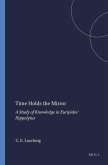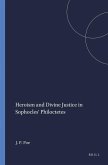This study shows that the "Ecclesiazusae" is an affirmation of the importance of persuasion in the fourth- century democracy.; Praxagora, the attractive and articulate female protagonist, virtually personifies "peitho," the realm of both political persuasion and erotic seduction. The ability of "peitho" to address both public and private motivations makes it the perfect instrument to resolve the tension in the fourth century between selfishness and civic participation. This is, after all, the central issue in the later episodes of the play.
Hinweis: Dieser Artikel kann nur an eine deutsche Lieferadresse ausgeliefert werden.
Hinweis: Dieser Artikel kann nur an eine deutsche Lieferadresse ausgeliefert werden.








